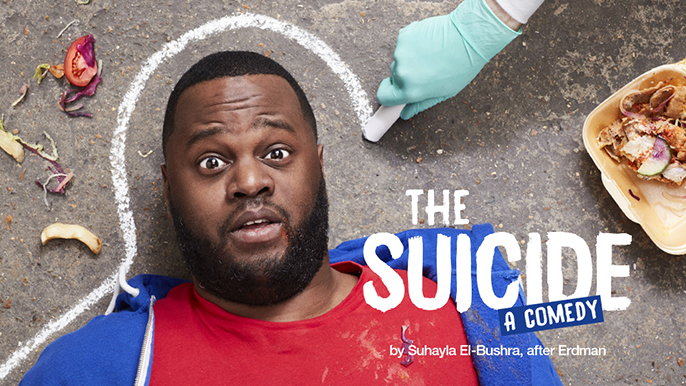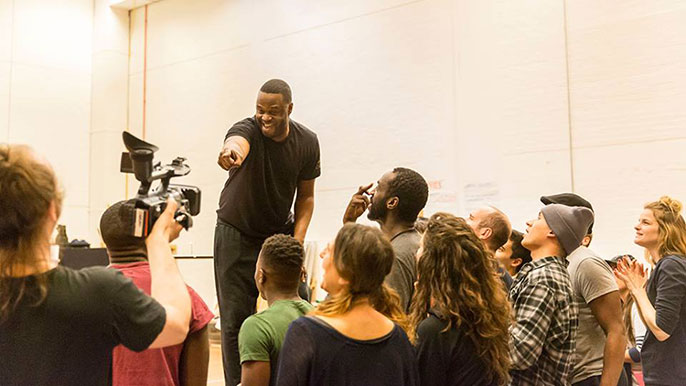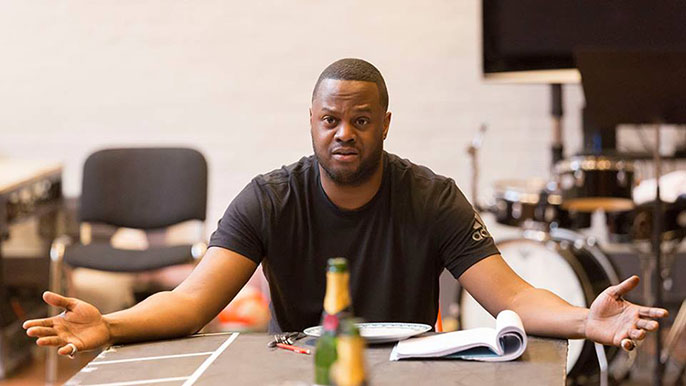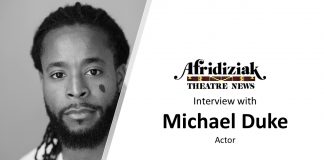Javone Prince – interview
The Suicide, National Theatre
Javone Prince has been cast to play the lead in the National Theatre’s new play The Suicide (see listing) and can’t believe his luck: “Yeah! Do you know what I mean? Well done!” is the actor’s response to my offered congratulations. “It’s scary, but exciting. I’ve been here before but to be the lead here is a completely different experience.”
Whilst the actor seems astonished at landing such a high profile role, it shouldn’t come as much of a surprise. If you have switched on your television in the last five years, you will be familiar with Javone Prince. His weekly shenanigans as wannabe gangster, Jerwayne in E4’s Phone Shop established him as a comedy pro. Since then the west Londoner’s flexible face has been popping up everywhere. As a roman bouncer in ITV2’s Plebs, a misanthropic teacher CBBC’s Hank Zipzer or even as a crowd rallying DJ in E4’s new show The Aliens.
The LAMDA graduate has even co-written and starred in his own BBC 2 sketch show, eponymously titled The Javone Prince Show. His current role is therefore a bold departure from tickling the nation’s funny bone. Sam is a young unemployed man in London, stuck living with his mother in law and contemplating the final solution. Prince describes his character, focusing upon the psychological impact of Sam’s situation. He often phrases his answers as questions to open up the wider issues.
What this play explores is the mess we’re in as a society. People can’t get work, people can’t feed themselves, and people can’t pay their rent. They can’t get the help they need and who’s to blame? And who’s more worthy of getting support?
“Sam is in his 30s and he’s jobless; he’s been signing on for five years. It’s not like he doesn’t want to work, he does, but he can’t get a job. How impotent must that make you feel? So he starts to think that suicide is the best option for him, but all these other people come in and infect his situation. They’re saying ‘This is my cause and what you should die for.”
Prince speaks to me during a hurried lunch of pasta and meatballs, which he has jazzed up with his own hot pepper sauce. Apparently after leaving the bottle in the NT’s canteen he returned to find it almost empty. Luckily as a naturally generous spirit, Prince doesn’t begrudge the sauce thieves “a lickle bit of spice.” This is a fairly fitting description for the man himself. Prince is a bundle of energy, speaking quickly and giving elaborate arm gestures in between sips of his ginger beer. He is also incredibly forthcoming, assuring me with a friendly arm pat “Ask me anything, please!”
The Suicide was originally written in 1928 by Nikolai Erdman during Russia’s Stalinist regime, this modern reimagining has been written by Suhayla El-Bushra (read interview) but without the backdrop of the draconian communist system, I am curious what this new production will be satirizing.
“It’s very much about the society we live in now and how Sam has ended up in this state. So people try to engineer his death around their own cause. The council that failed you, the local government or the welfare state, or the mental health institute that failed you. Everyone has their own thing, their own selfish aim.”

Prince speaks vehemently about the ever-increasing wage gap and standards of living in the UK. Having grown up in Acton “before it got gentrified” (and funnily enough, just round the corner from my family home) he has strong insights into the battles faced by low-income families.
“What this play explores is the mess we’re in as a society. People can’t get work, people can’t feed themselves, and people can’t pay their rent. They can’t get the help they need and who’s to blame? And who’s more worthy of getting support? Why is one group of people more likely to get helped than another if they’re in the same situation? London is so expensive, it’s suffocating, it’s choking for the working class.”
Prince goes on to assert his belief that a new social echelon has been borne out of the recession generation. He terms this ‘the underclass.’ “I think that now you have the upper class, middle class, working class and then you have the underclass. These are the people who are on the brink of homelessness and who have no say politically. It’s the middle class who are deciding there’s going to be a tax on x, y or z. It’s the working class who are having to work even harder to pay the new tax off and their mortgages. Then the underclass is on the grind, trying to find another zero hours contact, another job. Visiting food banks because they can’t afford to feed themselves. These are the people who can’t afford a new pair of shoes, medicine, food. It’s not just London, it’s western society. Like Erdman’s play, this is still about class and survival. In Britain today, everyone who doesn’t have that good job to make them feel safe, is feeling the strain and the fear.”
As a jobbing actor, Prince can relate to the challenge of being out of work. In fact his role in Phone Shop came as a saving grace after an eight-month dry spell. “I was dying. Dying! But my friend Andrew Brooke (Ashley in Phone Shop) who I was at LAMDA with took me to meet Phil Bowker (producer and director) and we went along with our characters and did some improv. Phil was like ‘Come back tomorrow’ and that was that.” It was Prince’s insatiable love for performing that led to him being given his own comedy show, which is a mix of stand up, sketches and live music from the likes of Omar and Alexander O’Neal. “I always muck about In between scenes ’cos I’m so happy that I’m acting, so after they say cut I’m carrying on doing something crazy and Phil was like ‘You know what, you need your own show.”

Prince cites Morecambe and Wise, Tommy Cooper and Benny Hill as his childhood comedy influences. With the arrival of cable television, he also became a fan of Bernie Mac, Martin Lawrence and Eddie Murphy. He maintains that Tommy Cooper will always be “The Don” and there’s something of that physicality and pratfalling in his stand up routines. The actor’s official foray into drama came about quite uniquely, though a television station called YCTV. This station was set up as part of the Challenge Anneka series, complete with the helicopter and Anneka Rice running around in jumpsuits. Prince remembers his time at the station fondly, explaining that his mother couldn’t afford to send him to stage school, so YCTV had been his outlet.
“It was brilliant, actors and people in the industry like Harrison Ford and Steve Martin would come down and give us talks. We’d be sent abroad to places like Canada or Italy to report on things or take workshops. It was fantastic, and it was through an outreach worker from LAMDA visiting that I went along to an audition. I didn’t know you had to pay money. I told them that I had no money for the fees and I got a scholarship for three years. That was the turning point for me as an actor and a person, as everything. When I went to LAMDA I thought ‘I have to do this, it’s in my soul, my bones.’ I appreciate everything they did for me.”
Overflowing with gratitude and all kinds of enthusiasm, Javone Prince is set to put his heart and soul into this incisive new production. Before he returns to rehearsals and gives me a unifying Acton hug, he tells me why people should come and see The Suicide.
“The Suicide is a reflection on what’s going on today and how we live today. It’s incredibly relevant. It’s also a funny piece, entertaining and it’s an amazing cast. So come down, it’s gonna be a lovely rollercoaster to go on. Put your seatbelt on and enjoy the ride.”
Info: The Suicide is at the National Theatre until June 25, 2016 | Book tickets


























